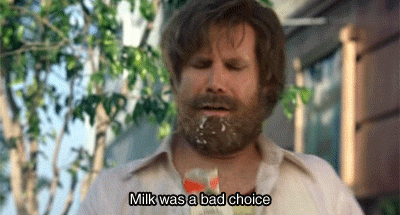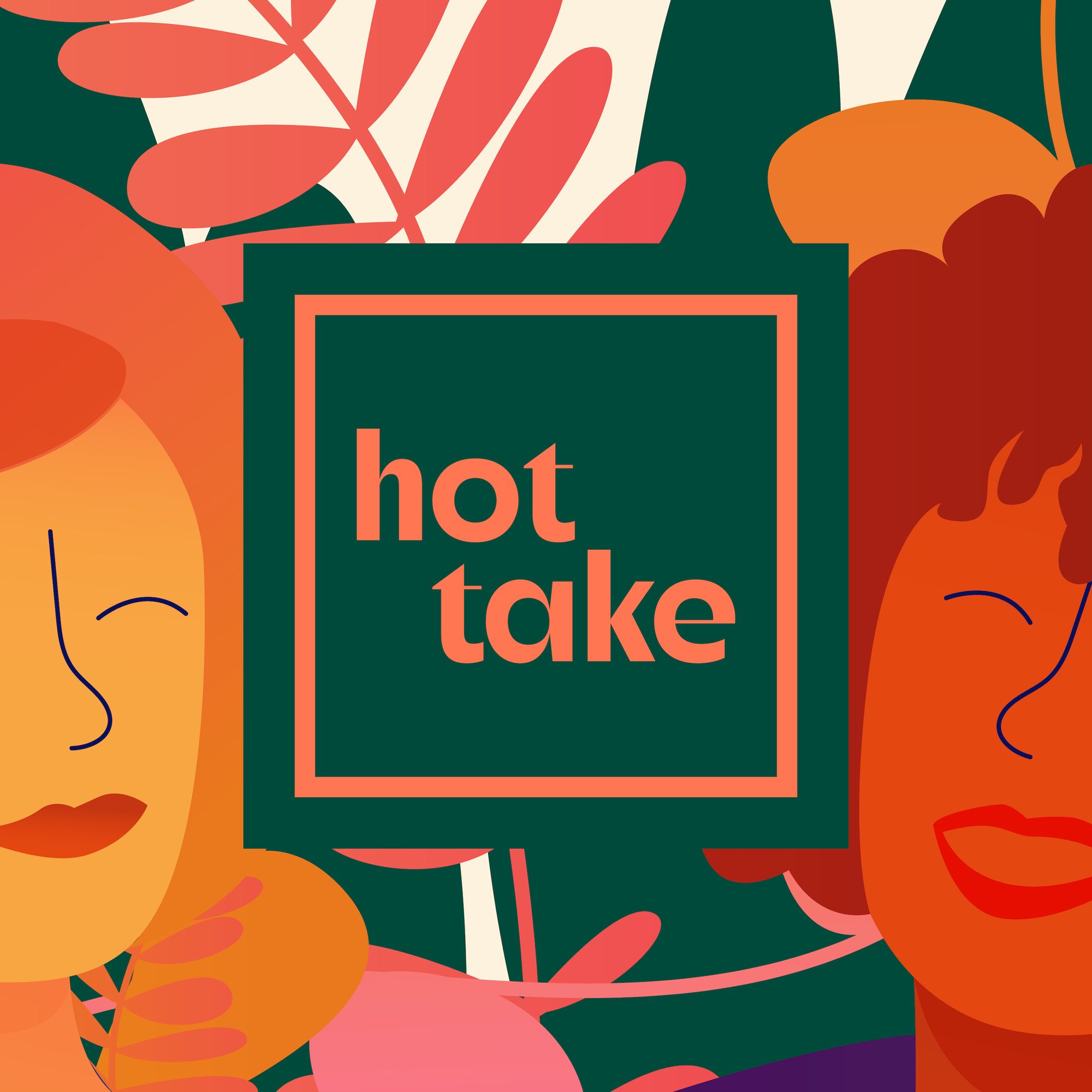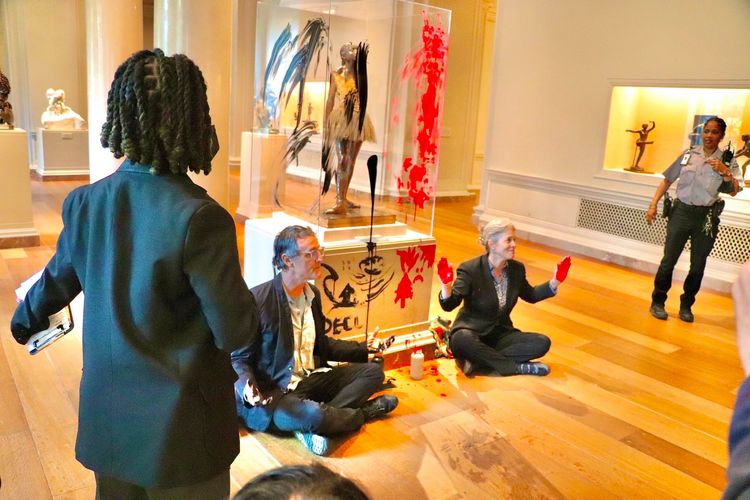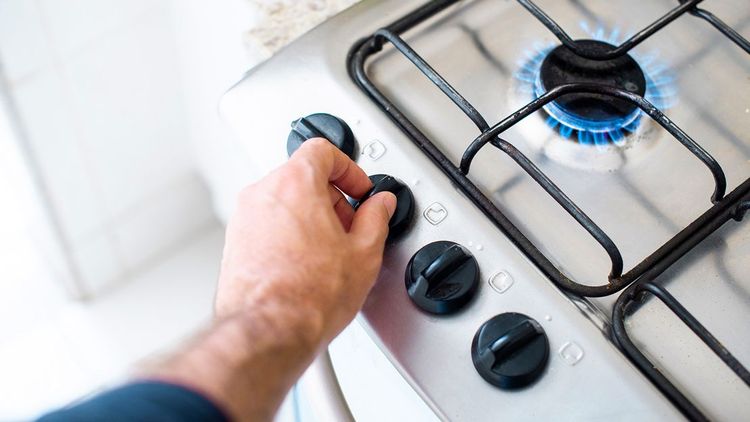Sometimes It's the Story You're NOT Telling

Hey Hot Cakes!
Welcome to this week’s edition of Hot Take Digest—a weekly round-up of the best climate writing out there PLUS analysis and commentary from Mary and Amy. In the past few weeks, we’ve seen an enormous influx of new subscriptions—both Premium (paid) and Community (free). This week, we want to show our gratitude by lowering the paywall and sharing the wealth. If you’re signed up for free emails and you like what you’re reading below, please consider subscribing. If that’s not an option for you, we understand. Really, we do. So, please follow us on Twitter, where we regularly raffle off premium memberships!
To our Hot Take premium members: thank you. As always. It’s because of you that we can give away free memberships and produce a free version of the newsletter that includes the round-up of coverages plus at least one original feature from Amy and Mary. Oh! And the podcast! But we can always use more of y’all! Make sure to share the newsletter with your friends! Don’t keep our relationship a secret!
Also, a few Hot Take announcements:
- Welcome, Drilled subscribers! This week, we're merging with the Drilled newsletter. So, if you joined us via your Drilled membership, rest assured that we'll still be keeping you posted on climate accountability. A key issue to watch out for right now: the fossil fuel industry has been mobilizing over the past few years to hit back hard against the two most successful forms of attack against them—pipeline protests and lawsuits.
- Your Subscription Money at Work! On Wednesday, Hot Take Premium members got a sneak peek of Mary's "Stop #AllLivesMatter-ing the Climate Crisis" essay and Amy's scoop on Chevron’s hypocritical support for #BlackLivesMatter while funding police in Black and brown Richmond, California.
- Big news, we now have … merch! And a new website! Big ups to Founding Member Larisa Ikeda for designing all of it (AND our updated pod logo -- she's so talented!). Shirts are sustainably sourced, fair trade, and hand-printed using organic water-based inks by an independent women-owned business in Philadelphia. All profits go toward keeping Hot Take going and growing. And premium members get 10% off all apparel forever (yet another reason to subscribe!).
‘Tis the (Hurricane and Wildfire) Season
By Mary Annaïse Heglar and Amy Westervelt
This year, like so many before it, is projected to be the hottest year on record. Until, of course, next year. That means that the wildfire season, which is already well underway, is expected to be worse than last year's. There have already been 28 fires in June (!) and we're not even halfway through the month. The warm temperatures also mean that this year’s hurricane season is shaping up to be more fearsome than years before. For starters, it’s early June and there have already been three named storms!
In times of disaster, communication and information is everything. From folks on the ground needing to know where to find safety and relief to folks far away needing to know where and how to send donations—lives are on the line. What’s worse: all of this is playing out against a pandemic and in a political climate that you might call...tense?
That makes it all the more important to pay close attention to how we’re talking about these events. As two people from wildfire land (Amy) and hurricane land (Mary), we have a few ideas on how to cover these events.
Wildfires
- Let firefighters talk. A lot of times we don't actually hear from firefighters except stats about how contained or not a fire is. But California firefighters are really good at connecting the dots on climate change! I had a CalFire chief tell me that because of climate change, we're not getting the usual drop in temperatures and increase in humidity at night that used to help firefighters get on top of a fire. Those are the sorts of things the general public will hear or read and go "ohhh yeah that's true it's not cooling off like it did when I was a kid … shit."
- Call "Imprisoned Firefighters" What They Are: Slave Labor and a Human Rights Crisis. Every year I see the "did you know?" stories about California's prisoner fire brigades. They've become a novelty act for the media, and frankly it's disgusting. These people are putting their lives on the line—not just in terms of immediate danger, but also the increased cancer risk that goes along with firefighting—for $2/hour. And they’re not even given a certificate they can use to get a job once they're released. It ought to be outlawed—not gawked at.
Hurricanes
- Tell the story. It’s kinda embarrassing that we have to say this, but too often when a hurricane doesn’t hit the continental United States, no one hears about it. Recently, the U.S. media has gotten better at this with coverage of storms like Dorian and Maria, but there’s still a lot more room for improvement.
- Put hurricanes into conversation with cyclones and typhoons. It’s pretty pathetic that Americans are so ill-informed about the existence of storms on other oceans. It’s up to journalists to disrupt that. Media silence and resulting public apathy about storms like Cyclone Amphan and Super Typhoon Yutu is simply unacceptable.
Both
- Make the connections between climate change and extreme weather. Don’t buy into the myth that it’s “not the time.” Y’all fall for that way too much.
- Go to the people who are hurting the worst, and they will always be the people who were hurting first. We’re talking about prisons, nursing homes, low-income communities, communities of color. That’s always where the real story is.
- Pay attention to disaster myths and don’t play into them. If you hear a wild story about looting and violence, check it before you report it. If Katrina taught anyone anything it should be to be careful about spreading untruths in a disaster.
- It's time to start talking about managed retreat. It’s a terrifyingly bureaucratic word for something that amounts to slow-motion evacuation, but the media should not avoid it. "Managed retreat" refers to relocation plans for areas that are becoming less habitable—wildfire-prone parts of the West, flood-prone parts of the Midwest, and parts of the coasts prone to storm surges in hurricanes and vulnerable to sea-level rise.
- Never, ever, ever blame the victim. Not for choosing to live where they live. Not for evacuating too late or not at all. Not for not buying the right supplies. Not for anything.
- Stay with the story. Hurricanes don’t end once they’re on shore. They turn into tornadoes and massive rain events. Those are dangerous and disruptive too. And on the fire front, what happens after the fire is critical—what gets rebuilt, how, and the impact it has on people are all part of the story.
What Is World Ocean Day to a Black American?
By Mary Annaïse Heglar
The first time I saw the Atlantic Ocean, I wept. I was 23 years old and on my first trip to Coney Island in Brooklyn. As I let the water wash over my feet, I knew it had been salted by the tears of my ancestors.
World Ocean Day is one of those far too many days where I feel especially alienated from the environmental movement as a Black person. While everyone else celebrates their love of the ocean and their fun family beach vacations, I am reminded that my family has only been able to access beaches for one generation—hardly long enough to build a tradition. If only environmentalists celebrated those who fought for access to nature as much as they celebrated those who limited it. But alas, I imagine the civil rights activists who integrated the beaches will not soon be honored in any environmental hall of fame.
This year, though, I decided not to stay silent. I posted on social media about the images that come to mind for me when I think of the ocean, and in them, there are no sandcastles. My mind immediately goes to slave ships and wade-ins. In a word: violence. Even in the images that don’t explicitly contain violence, it’s still there, looming.*
Because for African Americans, our relationship to the ocean began with a deep, deep trauma that has yet to be addressed. It’s why so many of us can’t swim. The same is true with the land, to be honest. That’s why if you search for images of Black people with trees, you will find us hanging from them. It’s why so many of us (myself included) bristle at the word “environmentalist.” You might see nature, but we feel pain. The environmental movement, or the climate movement, or whatever we’re calling this thing now, would do well to keep that in mind.
*Of course there are images of Black joy in nature. I have some of my own. I’m talking here about the images that first come to my mind when I think of the ocean.
How NOT to Talk to Your Black Friends Right Now
By Mary Annaïse Heglar
It’s no secret that the climate space is white as hell. And apparently that means that I, as a Black person in this space, am a lot of white people’s Black friend. While I assumed we all had many friends of many races, based on the level of outreach/hovering I’ve received and notes I’ve compared with other Black people in this space, that’s not the case.
Look, lots of people have written about the onslaught of attention, wanted and unwanted, that Black people have received in the past few months. I don’t exactly know how to tell you how to talk to your Black friend (because they're your friend), but I will offer some advice on what you abso-fucking-lutley SHOULD NOT do!
- Do not center yourself.
- Don’t complain about your racist relatives, either to make yourself seem like the hero who stands up to these villains or as the victim of such awful, awful people. We don’t need a White Savior, and we don’t want to be Your Magical Negro.
- I repeat: do NOT center yourself.
- Do not make the pivot into how hard all of this is for you to understand, so that now we have to explain it to you. Read a book.
- DO. NOT. CENTER. YOURSELF.
- Do not catalogue all the things you’re unlearning and how shattered your world is. Better than a shattered spine, ain’t it? We’ve had to know this shit since we were five and under. Your ignorance is your privilege.
- Do not center yourself. Do not center yourself. Do not center yourself.
- Do not lament how hard this must be for the “good cops.” Don’t nobody give no FUCK!
- Do not—and I cannot stress this enough—center yourself.
And when social distancing is finally over...GO MAKE SOME NEW FRIENDS, PEOPLE! HOLY SHIT!
Dunking on Milk Boi
By Amy Westervelt
Tom Cotton, the senator from the Great State of Arkansas, penned an op-ed in the New York Times encouraging Trump to "send in the troops'' on protestors. It prompted public criticism from Black journalists at the Times, then their colleagues, then a whole bunch of other high-profile journalists, all of whom condemned the Times for running what amounts to a piece of fascist propaganda in the newspaper. I've written op-eds, including for the Times, and had them fact-checked rigorously. Why the rules should be more lax for a sitting U.S. Senator I do not know, but here we are. As the story unfolded, of course Cotton started squawking about the media mob coming after him, and Bari Weiss, known for tattling to the boss if people aren't nice to her, joined in.
Free speech! The liberal elites have gone mad! A bunch of supposedly woke white guys joined in with "intellectual" arguments about how it's good, actually, to air such ideas as … having the military crush peaceful protest. Here's the thing: A sitting U.S. Senator has a built-in motherfucking platform, folks. He didn’t need a boost from the country’s paper of record. As Cottongate unraveled, we discovered that a) they pitched it to him. Hey, interesting tweet on militarizing the police, Tom Cotton, want to turn it into a column? b) James Bennet, the editorial page editor, didn't read the op-ed before it was published. c) It wasn't as closely edited as other op-eds.
- There’s a whole lot else wrong with this situation, more than we can get into here, because there’s a whole lot else wrong with Mr. Cotton. And we really want to get into that. The man drinks milk. He has requested milk—more than one glass in one sitting!—be brought to him on the floor of the U.S. Senate. You know which other grown men drink milk? On its own? Out in public? White supremacists. Which brings us to...
- That time he said "there is no systemic racism in America" - Guys that was this week.
- Let "the markets" take care of climate change! Look he's not the first or only pencil-necked white guy to think the magical markets solve all problems, and especially climate change, but he is the one who loves milk the most.
- He thinks any climate action is "radical"- Democrats have been so weak on coronavirus negotiations their own voters are fed up, but Tom Cotton thinks they're pushing a radical agenda because they asked for, and didn't get, fuel emissions standards and tax credits for wind and solar (but the fossil fuel industry getting billions is totally fine).
- He's definitely gonna go straight from anti-immigrant to ecofascist Cotton supported Trump's Muslim ban and border wall. He shares Trump's obsessive fear of Mexico and Mexicans, once wildly accusing Mexico of … coordinating with Hezbollah. Mmkay. Not all brown people speak the same language Milk Boi!
- He thinks women are too weak for combat, and secretly just want men to worship them. Back in one of his earliest op-eds, Cotton concluded that women just want a guy to commit, and look after them. Years later, as a Senator, Cotton told Laura Ingraham, "To have women serving in infantry could impair the mission-essential tasks of those units … it’s nature, upper body strength, and physical movements, and speed, and endurance, and so forth.”I can think of at least 20 women right now who could dunk Milk Boi no problem, but sure.
- Milk Boi over here eats birthday cake and ice cream every day. And weighs all of like 100 pounds. Check the man’s freezer! There might be more than ice cream in that bitch if you know what I mean...
Talking Op-Eds with the Best Editorial Page Editor We Know: Bina Venkataraman of The Boston Globe
Folks outside the media may not know much about how opinion pages work — could you give us the basics?
I can't speak for every opinion section at every news organization, but generally editorial page editors and oped page editors work together to set editorial priorities for the sections, while also seeing what ideas in the form of pitches and letter submissions come in from readers and the community.
Writers are ideally vetted for: what they can contribute to the public conversation, their authority or qualifications to write about the topic (which might be personal experience not professional bona fides in many cases), their credibility/reputation/capacity for upholding journalistic standards, and their ability to write fluidly and cogently to elevate the conversation. Their pitches are ideally vetted for how surprising the idea is and how rigorous and convincing the argument, what kind of evidence they bring to bear, and whether they address the best (vs the weakest) counter-arguments. The pitches are vetted based on whether we've already published many similar takes, and whether it's something lively that makes people think or something that can readily be dismissed as coming from one political ideological camp or another. It helps when they are colorful, feature real human beings or stories, marshal robust evidence, and when the point is one that most people have not fully considered or advanced.
Sometimes we'll solicit a pitch based on an interesting perspective or a topic we want to cover. An example of that came in April, when I saw a young man (not a journalist or scholar or someone with a public profile) tweet about his fear of wearing a makeshift face mask while Black. I asked him to write the op-ed because it was a poignant take and a beautifully crafted, poetic tweet.
There’s been a lot of conversation about the NYT decision to run Tom Cotton’s “send in the troops” op-ed, what do you think plays into decisions to give some opinion writers leeway while others are closely fact-checked?
I think time pressure and the desire for attention plays a lot into lapses of judgment like this, in a media and information environment where everyone is trying to have provocative takes that go viral on Twitter. I also think that the quest for ideological diversity in the Trump era is fraught—it sometimes leads editors to pursue token conservative points of view even when those are not grounded in fact or are downright dangerous. I wrote a couple threads with my thoughts on all this.
I also wrote a book about how short-term measures of progress like page views and retweets can distort and distract people and organizations from doing what's truly of value.
Have any big ideas emerged out of the Cotton conversation that you think could improve op-ed pages in general or that you yourself want to implement at the Boston Globe?
Absolutely. Op-ed and editorial pages should run views that its editors and writers disagree with, but the op-eds have to meet basic standards of journalistic ethics and they need to have value that justifies giving them a platform. I think shallow gestures at ideological diversity or representing the full scope of the political spectrum need to be checked in this era, especially when the president of the United States frequently distorts and misrepresents the facts and gestures at authoritarianism. It's also worth questioning what kinds of views should be transmitted as stand-alone op-eds using the platform of the publication to amplify them, as opposed to as news stories or Q&As where the views can be interrogated and the facts can be asserted to counter falsehoods or reckless arguments.
I think this moment also gives us the opportunity to reimagine what an op-ed is and find new formats for arguments to be aired and challenged by the public. We're already doing some of this at the Globe and more of it is to come. But I think what's clear to me is that op-ed pages should not be venues for political manifestos of would-be authoritarians or tyrants. I would not have published Cotton's op-ed nor would I have published Pol Pot's op-ed. That's not to say either of them would or should have trouble getting their views into the public discourse, just that it's not responsible opinion journalism—or at least not the kind I want to be part of—to offer up a call for violence against one's own people on a platter without interrogation. That kind of line is easier to draw and articulate after an incident like what happen with the Cotton op-ed, so in a way The New York Times has handed the rest of us the gift of this mistake that we can learn from and use to articulate where our own lines are, and what our goals are for our opinion sections.
What are some of the key ways that diversity in the editors overseeing opinion pages impacts what gets run there, in your opinion? How does that show up in climate-related op-eds?
Diversity definitely has an impact. The Globe's Ideas editor Anica Butler is a great example of that. She commissions all kinds of thought-provoking and interesting pieces and she also has brought more people of color into our pages. It should ideally be the case that all editors, regardless of race or gender or class or politics, tap into a wide variety of voices. But the reality is that diversity of all kinds brings access to different networks and brings the kind of sensibility and intellectual worldview sometimes needed to thoughtfully edit particular pieces. It's important in my view also to have women as editors in opinion sections and not just one or two. Women are historically severely underrepresented as op-ed writers; people tend to give them less assumed authority and credibility. It's also the case that women probably perceive higher barriers to pitching and placing op-eds. Class is also a factor. While we all have ingrained biases, we have a team at the Globe right now that pursues all kinds of voices for our pages, and we're working to do better and better over time.
As for climate change op-eds, I do think we try to look at it from different dimensions: policy, science, communities, justice, voting, and beyond. We've had all kinds of people write for us about climate change and hope many more will with new angles and ways into the conversation. Mary Annaise Heglar wrote for the Globe in April, in fact!
Digest
This week in climate coverage:
Climate change: still happening!
Carbon Dioxide Has Never Been Higher By Brian Khan in Earther
Our Infrastructure Is Designed For A Climate That's Already Gone By Shayla Love in Vice
Tropical Depression Cristobal Could Make Lake Superior Landfall By Brian Khan in Earther
Florida’s Flooded Future: ‘Retreat While There’s Still Time’ By Laura Raim in The Nation
Beyond a climate of comfortable ignorance By Kevin Anderson and Isak Stoddard in Ecologist
The good and bad of COVID's climate impact
'More masks than jellyfish': coronavirus waste ends up in ocean By Ashifa Kassan in The Guardian
WTF
'Selling off the future’: Trump allows fishing in marine monument By Emily Holden in The Guardian
Court overturns EPA approval of popular herbicide made by Monsanto By Carey Gillman in The Guardian
New bill would prohibit the president from nuking a hurricane By Maddie Stone in The Washington Post
Trump trashes 50-year-old environmental law, blames coronavirus By Rachel Ramirez in Grist
Protest Planet
For indigenous protesters, defending the environment can be fatal By Rachel Ramirez in Grist
Pollution Is Racial Violence By Yessenia Funes in Earther
Glimmers of climate hope
The Future of Solar Is Double-Sided Panels that Follow the Sun By Dharna Noor in Earther
Weird Sea Creatures Live In 'Snot Palaces' That Capture Carbon By Dharna Noor in Earther
Meet the Marine Biologist Making Urban Oceans a Climate Asset By Alexandra Gillespie in Scuba Diving
Black and Green
It's Time for Environmental Studies to Own Up to Erasing Black People By Wanjiku Gatheru in Vice
Fossil Fuel Fuckery
Living near oil and gas wells linked to low birthweight in babies By Nina Lakhani in The Guardian
After Big Blowout, Assam's Baghjan Oil Field Catches Fire By Gaurav Das in The Wire
What do you get from a pampered cow?
Spoiled milk






Only paid subscribers can comment.
Please subscribe or sign in to join the conversation.